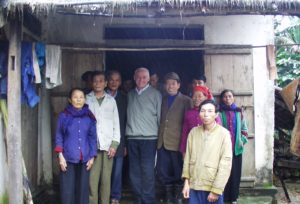Colored Glasses
By the way I count, I’ve been to Vietnam five times: the first a completed combat cruise; the second a cruise with an extended stay in N. Vietnam’s prisons; the third with a film crew doing a series on the twentieth anniversary of the fall of Saigon; then I tagged along on a university trip to set up an exchange program for Vietnamese students; and the last, a month-long trip from south to north by ground transportation. A significant part of that last trip was stopping in the villages that participated in my shoot down and getting to meet some of the people who captured me. (see below)

Each trip to Vietnam has resulted in a life changing experience. I expect the forthcoming trip will be as significant in its own way. The odyssey continues.
The trip consists of 12 veterans, 12 students, and a half dozen members of the college staff. How will their individual odysseys play out? Each of us relates to the Vietnam War era differently. Many vets endured things beyond description that defy comprehension by the rest of us. Some will be returning to Vietnam for the first time. On my first return trip, I met some ghosts of the past and saw them in the new daylight of the present. I found an unusual exhilaration walking around the outside of the fifteen-foot-high wall that I had only experienced from the inside before. 25-year-old bomb craters had found new life as a watering hole for water buffalo and a building that once held prisoners became a storage shed.
Much of what we may learn on the trip will be a result of seeing things from the perspective of others in our group. I’m anxious to hear the views of the students who study it as history. I expect they will bring a freshness that those of us who lived through it are unable to see. But isn’t that usually the case? We all look through our own colored glasses.

